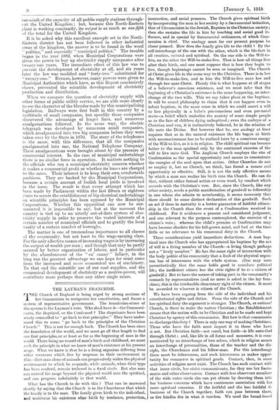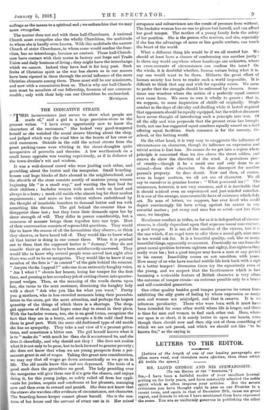THE LAYMAN'S FRANCHISE.
r1 IRE Church of England is being urged by strong sections of
her Communion to reorganize her constitution, and frame a system of representative government. The foundation-stone of the system is the Layman's vote. Who shall have it—the Communi- cants, the Baptized, or the Confirmed ? The disputants have been wisely counselled to " go back to first principles." They have under- stood this to mean " go back to the principles of the Christian Church." This is not far enough back. The Church has been since the foundation of the world, and we must go all that length to find our first principles, or at least as far as the beginning of man in the world. There being no record of man's birth and childhood, we must seek the principle in what we know of man's existence at his present stage. What we know is that he is a living organism differing from other creatures which live by response to their environment in this—that man alone of animals can progressively widen the physical environment to which he responds, while animals, when their type has been evolved, remain tethered in a fixed circle. But also man can extend his range beyond the physical world into the spiritual, and can progress indefinitely in that world.
What has the Church to do with this ? That can be answered shortly by saying that the Church is to the Churchman that which the family is to the man. The family gives birth to the individual, and maintains his existence after birth by tendance, protection,, instruction, and social pressure. The Church gives spiritual birth by incorporating the man in her society by a Sacramental initiation, that of Circumcision in the Jewish, Baptism in the Christian society; then she sustains the life in him by teaching and social good in- fluence, and in special by Sacramental ordinances, of which Com- munion is chief. The analogy must for our present purpose be closer pressed. How does the family give life to the child ? By the self-interchange of the one with the other, which is the life,fact in all creation, natural and spiritual. On the one side is the Will-to- live, on the other the Will-to-make-live. That is how all things live after their birth, and one must suppose that is how they begin to live, though beginnings cannot be seen or imagined. The Church of Christ gives life in the same way to the Christian. There is in her the Will-to-make-live, and in him the Will-to-live unto her and through her unto Christ. Plainly this is what happens at all stages of a believer's conscious existence, and we must infer that the beginning of a Christian's existence is the same happening, an inter- change of the two wills. This we say takes place at the baptism. It will be sound philosophy to claim that it can happen even in infant baptism, in the same sense in which we could assert a will to live physically in a babe's pre-conscious and even pre-natal state—a belief which underlies the anxiety of some simple people as to the fate of children dying unbaptized ; even the embryo of a Christian soul can, it is instinctively believed, be in the relation of life unto the Divine. But however that be, our analogy at least requires that as in the natural existence the life begun at birth with unconsciousness has to bo realized later by a conscious energy of the Will-to-live, so it is in religion. The child spiritual can become father to the man spiritual only by the continued exercise of the will to live unto God. The Anglican Church employs the rite of Confirmation as the special opportunity and means to concentrate the energies of the soul upon that action. Other Churches do not so employ it, but no Church, we think, has found a means and opportunity so effective. Still, it is not the only effective means by which a man can realize his birth into the Church. He can do that, without either formal action or even word, by conduct which accords with the Christian's vow. But, since the Church, like any other society, needs a public manifestation of goodwill to fellowship in one whom she admits to membership, it seems necessary that there should be some distinct declaration of this goodwill. Such an act if done in maturity is a better guarantee of faithful citizen- ship in the Church than the event of a Confirmation received in childhood. For it evidences a present and considered judgment, and one relevant to the purpose contemplated, the exercise of a citizen's vote ; whereas the child's promise at Confirmation may have become obsolete for his full-grown mind, and had at the time little or no relevance to his communal duty in the Church.
These considerations yield immediate deductions. A man bap- tized into the Church who has appropriated his baptism by the act of will is a living member of the Church—a living though perhaps not a " lively member." He has the same right of interaction with the body politic of his community that a limb of the physical organ- ism has of intercourse with the whole system. (One may note parenthetically that the same holds good in mundane political life ; the inefficient citizen has the civic rights if he is a citizen of goodwill.) But to have the means of taking part in the community's counsels by representatives (and no more is asked in the lay fran- chise), this is the irreducible elementary right of the citizen. It must be accorded to whoever is citizen of the Church.
We have been arguing from the side of the individual and his constitutional rights and duties. From the side of the Church and her spiritual duty the argument is stronger. The Church, as national Church, is there to make the nation Christian ; the Establishment means that the nation wills to be Christian and to be made and kept Christian by agency of this communion. But how is that communion to discharge thisduty ? There is only one way of making Christians. Those who have the faith must impart it to those who have it not. But Christian faith—not creed, but faith—is life unto God through Christ ; and, like life in all forms and measures, it is corn. municated by an interchange of two selves, which in religion means an interchange of personalities, those of the teacher and the dis- ciple, the Churchman and his fellow-man. For this interchange there must be inrercourse, and such intercourse as makes oppor• tunity for commerce in spiritual goods. Contact, then, in some activities of religion must exist. The Church has such contact with that inner circle, her strict communicants, for they use her Sacra. ments and other observances. Contact with less observant members of the wide outer circle she can yet obtain by drawing them into her business concerns which have continuous association with her more spiritual concerns. If the faithful and the less faithful dc business of the Church together, faith can pass between them, as fire kindles fire in what it touches. We need the broad-based
suffrage as the means to a spiritual end ; we enfranchise that we may more evangelise.
The matter does not end with these half-Churchmen. A national Church must evangelise also the wholly Churchless, the multitude to whom she is hardly even known. With this multitude the narrow Church of strict Churchmen, to whom some would oonfme the fran- chise, has no interchange, because no contact. These half-Church- men have contact with their mates in factory and forge and Trade Union and daily business of living ; they might have the interchange which we cannot. Indeed they have had it for long past. Such fruits of Christian spirit as the war has shown us in our masses have been ripened in them through the social influence of the more Christian elements among them. These must still be our missioners, and now with a commission from us. That is why our half-Chnrch- men must be members of our fellowship, freemen of our common- wealth ; only with their help can our Churchless be enchurched.
Merck/um.



































 Previous page
Previous page